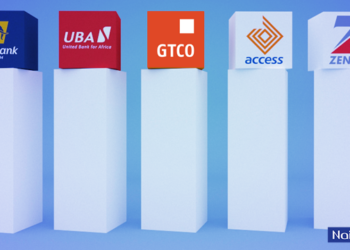Stocks of Nigerian banks, especially FUGAZ, have been investors delights for a while now, as stock market analysts placed some of them on ‘Buy’ even amid Coronavirus pandemic.
The experts, who spoke with Nairametrics in separate interviews, are optimistic that the banking segment of the Nigerian stock market would always give their shareholders reasons to smile, especially if the Central Bank of Nigeria (CBN) addresses an important issue, which is apex bank’s policy for non-performing loans.
Mohamed Abu Basha, Head of Macro Economy, EFG Hermes explained that the banking segment would yield more returns to the shareholders if CBN introduces more lenient policies to the banking sector.
READ: GTBank, Access Bank, others attract foreign investment worth $5.85 billion in Q1
Basha said, “Banks stock are hot stocks always, assuming the CBN’s policy for NPL recognition and subsequent provisions remains lenient.
“In such a scenario, we think banks could continue to report relatively robust profitability (compared to the other listed segments) and dividends, which would provide a cushion for investors against forex risks and a domestic low-yield environment.”
Returns on Equity (RoE) effect
Over the years, investors have enough faith in the earnings of top NSE-listed banks to buy them when economic recovery and rising future earnings are in prospect, and to sell them when prospects worsen.
Guy Czartoryski, Head of Research, Coronation Asset Management explained that buying those stocks with strong RoEs when their valuations are depressed is still a reasonable, and potentially money-making tactic.
READ: More gains than losses for Nigeria’s billionaires in Q2, 2020
According to him, GTBank, Zenith Bank, Access Bank have a record of 20.53% RoE since the recession year of 2016 when banks were caught out by currency devaluation and high exposure to oil companies’ debt.
Czartoryski’s recommendations are not based on speculations but facts.
He said, “The trend since the recession year of 2016 has been steadily upwards. The trend suggests that, on aggregate, the banks are becoming worthwhile investments (though certain recent restrictions on their ability to charge fees & commissions puts a question mark over this).
“The most noticeable thing about the top four banks is GT Bank’s superior and consistent RoE. And (apart from ETI’s unfortunate loss in 2016), the overall trend in RoE appears to be upwards.
“Zenith Bank has joined GT Bank as a strong performer over the past three years, while Access Bank joined this fortunate group last year.”
READ: A higher profile for the DFIs under COVID-19
Stock price performance
Sadly, the listed banks with strong RoEs over the past 10 years have not been rewarded with commensurate stock price performance.
For instance, Zenith Bank has achieved an average RoE over the period 2010-19 of 19.4%, with RoE improving to 20.5% over the last three years.
But what has been the reward, in terms of total share price returns? A compound annual growth rate (CAGR) of 12.1%.
“This is well short of our Fair Value Equity Return (FVER) and even short of our Fair Value Risk-Free Return (FVRFR).
“GT Bank’s story is very similar to Zenith Bank’s story. Access Bank has improved its RoE in recent years, and is approaching our benchmark RoE, but this improvement has not been reflected in its total share price return,” Czartoryski added.
READ: CBN imposes fresh CRR debits on banks to the tune of N118 billion
What is going wrong?
Share prices depend on confidence. Total share price returns that fall short of RoEs demonstrate that confidence has waned. This means either that investors will continue to under-rate banks, even when those RoEs are sufficient, or that banks stocks are very cheap at these levels, because their ratings will be restored in the future.
If the latter is the case, then investors should be buying bank stocks. In technical terms, Czartoryski described this as an erosion of price-to-book (P/BV) and/or the price-to-earnings (PE) ratio over the long term.

























Please I would like to know, I have shares in Skye bank before it became polaris bank, can I still sell those shares